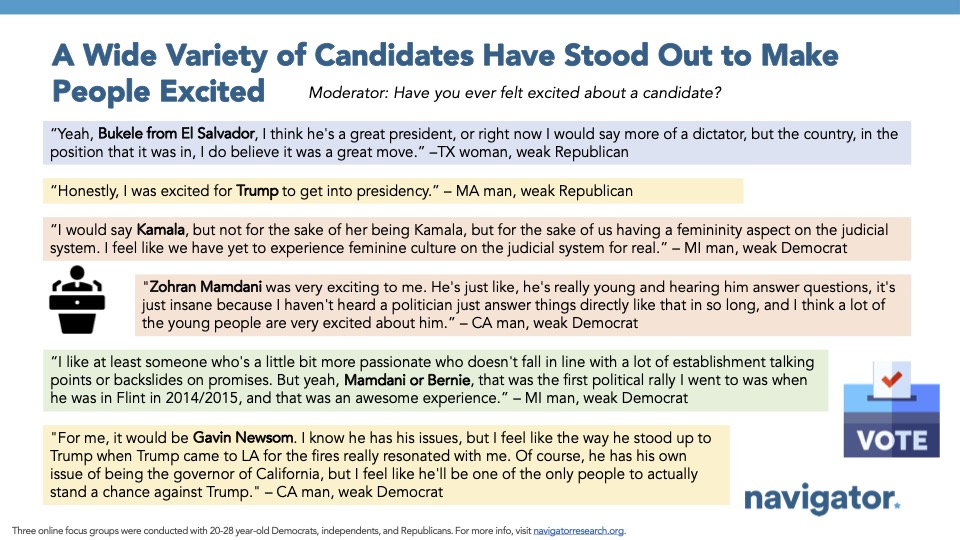Poll: Gen Z
This Navigator Research report covers findings from focus groups among Gen Z voters on the state of the country today, including what news is breaking through and how they think about their political identities.
Gen Z has come of age in an unprecedented and volatile environment. Their young lives have been shaped by Covid lockdowns, political, social, technological, and economic upheaval. Gen Z is 6 points more likely than average to say that the country is on the wrong track, and 44 percent predict that the country will be worse off a year from now. Gen Z’s economic outlook has stayed consistently negative and sticky over time: 72 percent rate the economy negatively today, compared to 63 percent of all Americans. In light of Covid disruptions, volatile housing markets, flip-flop student loan relief policies, and saturated job markets, 56 percent of Gen Z feel uneasy about their finances.
To better understand these dynamics, we conducted three Gen Z focus groups featuring participants both with and without a college degree, to hear about their experiences and outlook.
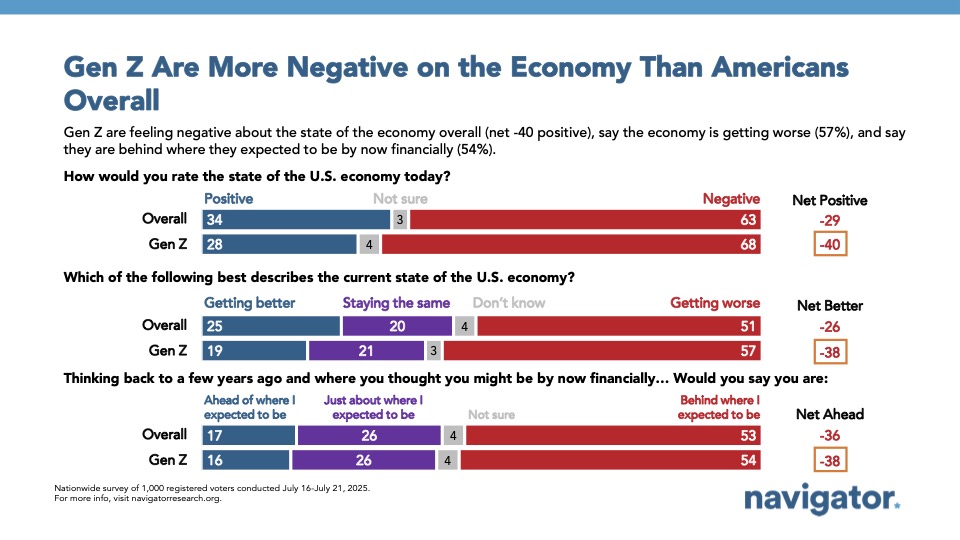
“I’m just trying to be optimistic”
Gen Z respondents point to a range of external challenges shaping their lives.
A young woman from Michigan put it this way:
“I feel like there are still a lot of people that are seeking for jobs that you hear a lot of stories of people saying that they’re applying to hundreds of places, and can’t get accepted anywhere, and also fighting back and forth between politics right now, and are we going to war? Are we not going to war? And everything with deportation… I feel like none of that stuff is really going well for us right now.”
Gen Z respondents are worried about the future, and even those who say the country’s best days are ahead are only reluctantly optimistic.
“I guess I’m just trying to be optimistic because in some ways the country’s better. I mean, technology is making things more accessible than ever and I don’t know, things are uncertain, but I just don’t think we’ve seen the best yet. I don’t know. I guess more of an instinctual feeling and hope.” — MO woman, weak Republican
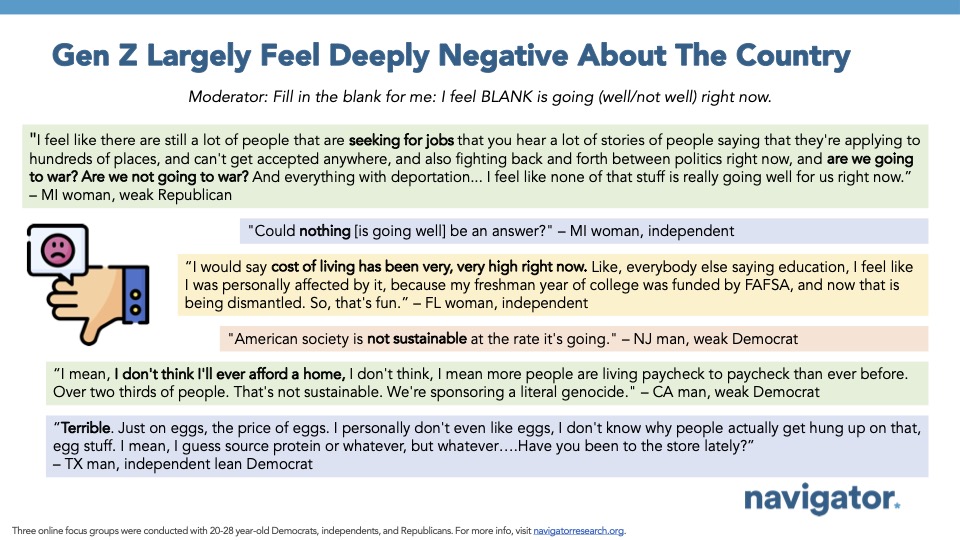
Many are also struggling with acute personal challenges, some that are directly caused by government action.
“My cousin had cerebral palsy and I took care of him… since I was, say, about 13 years old. Well, Texas’ healthcare system is botched completely… he died from a sudden seizure because we couldn’t get a seizure medication… I’ve had way too many, all of them, all my family die due to poor management of the health system and the systems they’re in.” — TX man, independent lean Democrat
“I spend a good chunk of my income on my medical costs.” — CA woman, weak Democrat
“I know I mentioned about the ICE raids. Since I am Latino like I said, I felt like I have a target on my back. I do carry my passport everywhere I go now just in case they want to stop me.” — CA man, weak Democrat
“I would say cost of living has been very, very high right now. Like, everybody else saying education, I feel like I was personally affected by it, because my freshman year of college was funded by FAFSA, and now that is being dismantled. So, that’s fun.” — FL woman, independent
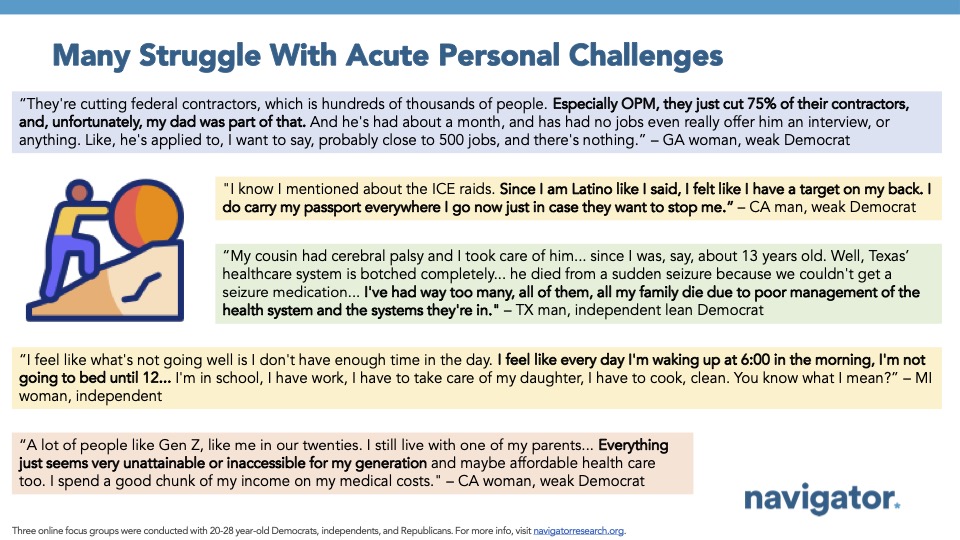
“It feels like a time that I forget”
According to participants, the problems they face are due to a myriad of factors, but it’s notable that they did not mention COVID unprompted. This is not to say that COVID did not affect the world profoundly, but Gen Z respondents are reluctant to blame their current problems on a time they put in the rear view mirror. To one Ohio woman: “It’s weird to remember [COVID], because it feels like a time that I forget about just because nothing was going on besides me sitting at home watching TikTok pretty much.”
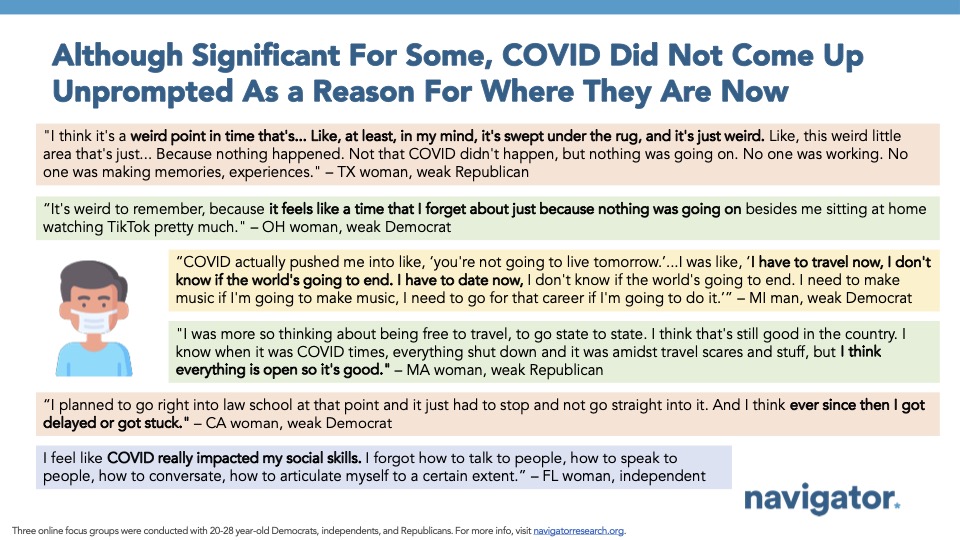
“Personally, it doesn’t affect me”
There’s a disconnect between the problems they face and their sense of the government’s ability to deliver solutions.
“I guess [government] doesn’t necessarily affect my daily life, but just overall or … Like, in terms of some situations, I guess, it does, and I guess cost of different things, and just inflation….Yeah. Things like that.” — RI woman, independent lean Democrat
Talking about the recent Republican tax law, one respondent said:
“Personally, it doesn’t affect me except for the food stamps part of it. I do get food stamps. So, it probably will make it a little bit harder for me.” — GA woman, weak Republican
“Anytime people talk about the deficit, it’s such a tired talking point… No one actually cares about the deficit, let’s be real.” — MI man, weak Democrat
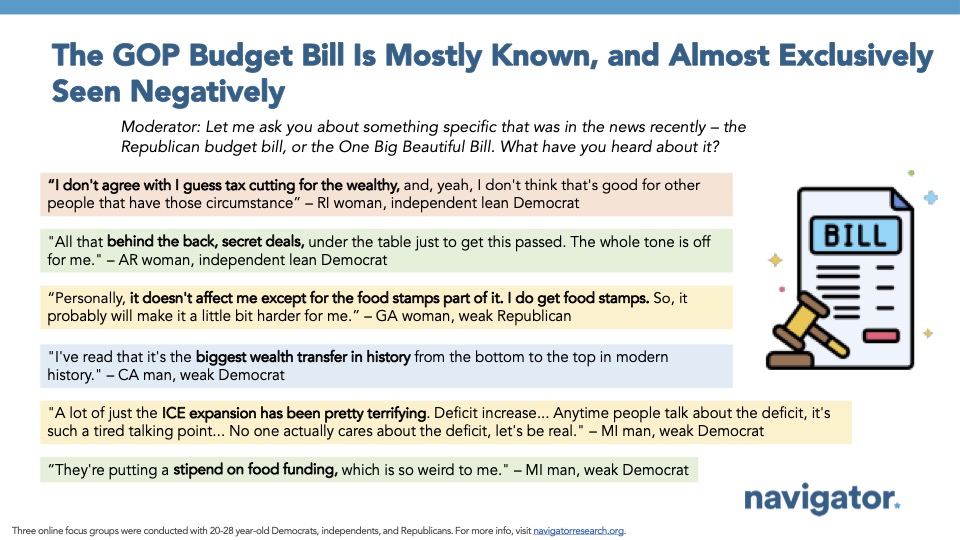
“I think I would have had different words.”
When asked about their political identity, some use traditional words to describe partisanship or ideology but string them together in a non-linear way. Others choose political identities not aligned with the existing spectrum.
“I think I would have had different words. I considered myself a Democrat growing up, but now I’m on whoever economically benefits society. That’s whose side I’m on.” — MI woman, independent
“I would consider myself pro-neighbor.”
“I would say I’m in the middle, leaning conservative/Republican, moderate, more moderate.”
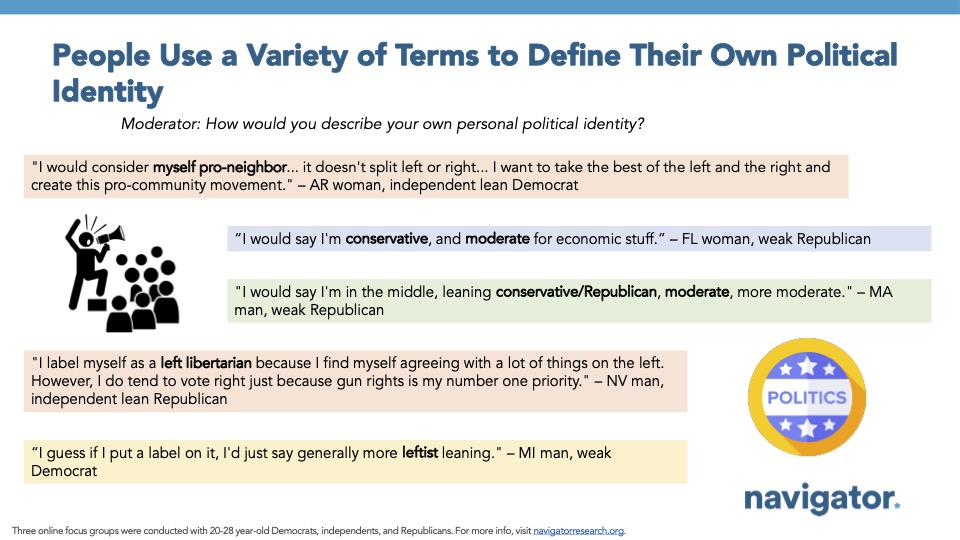
“Big Old News”
Gen Z’s most cited sources for news and information are social media, online news sites, and social media creators. Gen Z is 13 points more likely to identify as “passive news consumers” than the national average.
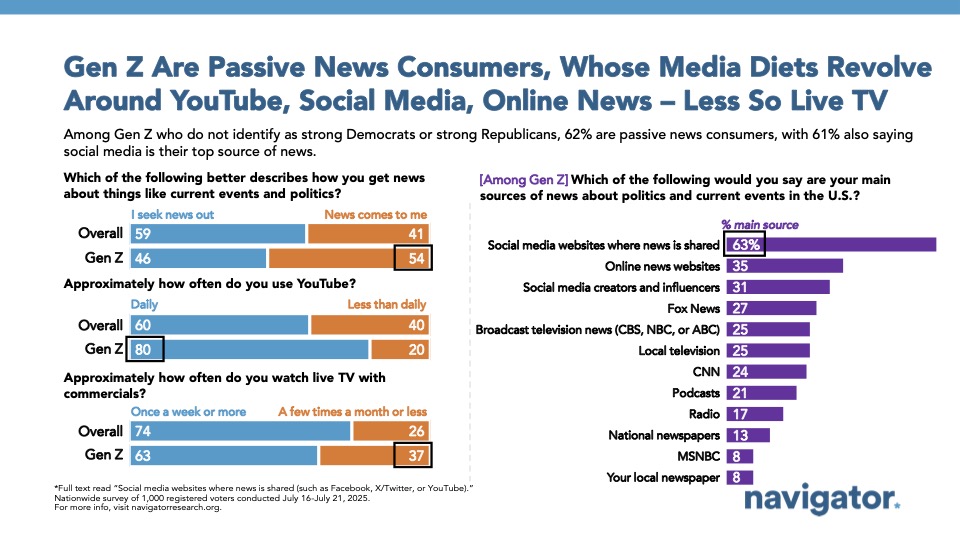
As a result, quick hit news dominates their feeds. In focus groups, Epstein was mentioned frequently when asked what news Gen Z is hearing. Gen Z are 8 points more likely to suspect that the Trump administration is covering up the client list, and 11 points more likely to suspect that being included in the list entails serious accusations.
Gen Z cited a variety of ways in which they find news on social media.
“I follow a few people that are very neutral I guess. They try to just give the straight-up information…I don’t know their names. I just know their face on TikTok. I just know their face.” — TX woman, weak Republican
“I get my news from Reddit. And then maybe 20% of it is from YouTube shorts when I’m scrolling through and some news channel or something will pop up.” — NV man, independent lean Republican
Gen Z still says it relies on legacy media to “fact check” things they see on social media.
“YouTube mainly. And then occasionally Facebook and Apple News, if it’ll pop up on my phone and I click on the article, read it.” — MA woman, weak Republican
“Yeah. I grew up watching the news all day every day. And I don’t like the news. I think it’s very biased, whether it’s one side, or another side. I don’t like it. So, I tend to not watch it. … So, yeah. I don’t know. I tend to see more of what’s going on in the communities rather than big old news.” — TX woman, weak Republican
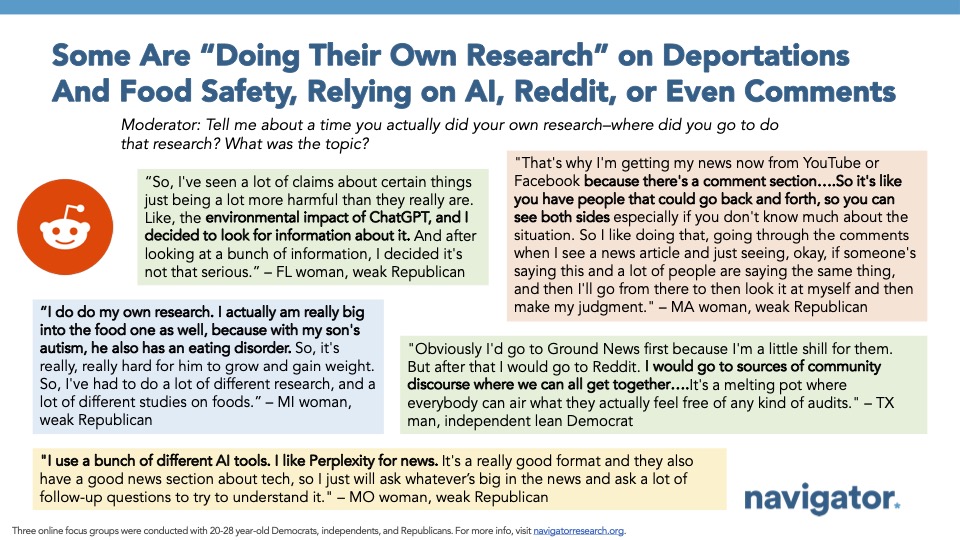
It’s not necessarily a strong sense of trust that drives them to legacy media sources, but rather the ability to see both sides of an issue.
“So I like to search a bunch of information, really broadly, pick whatever is repeated, so then I know that information is true because it’s repeated towards all the outlets.” — NJ man, weak Democrat
“I usually go back to my big three US ones, ABC, NBC, and CBS. And if I’m really uncertain, sometimes I’ll go to BBC because… they have some greater perspective on what’s going on here in the States.” — AR woman, independent lean Democrat
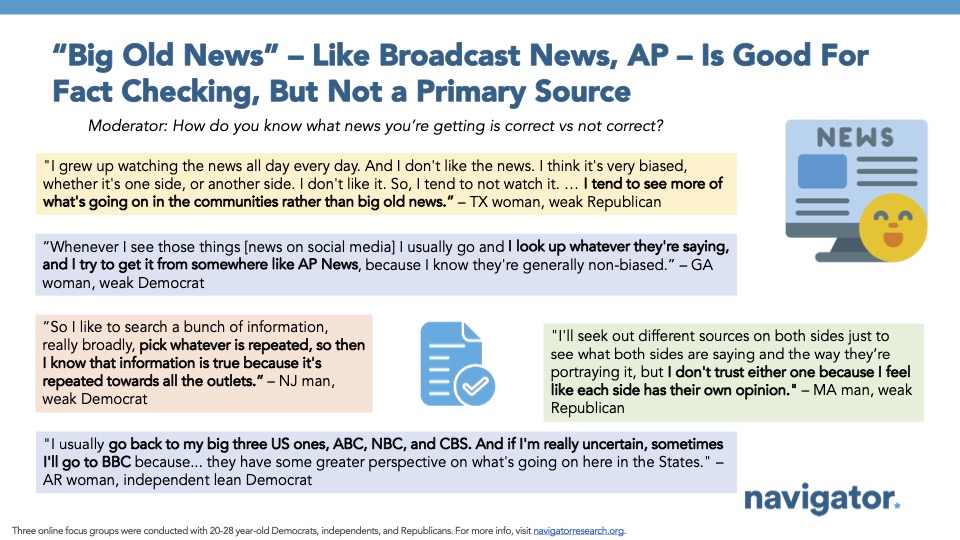
For others, the news is too overwhelmingly bad to bear.
“Can I be honest? I tend to ignore the news because it’s really negative. But it’s been a lot of war, a lot of deportation, just a lot of violence, killing, just a bunch of negative stuff.” — MI woman, independent
“All the stress of the news. Someone else mentioned sometimes just opening my phone it’s like, ‘World War III, is that coming now?’ It’s not bad enough that I have my own anxiety. The whole world is stressful too….That’s why I try to minimize negative news, but it’s really hard. It’s everywhere.” — MO woman, weak Republican
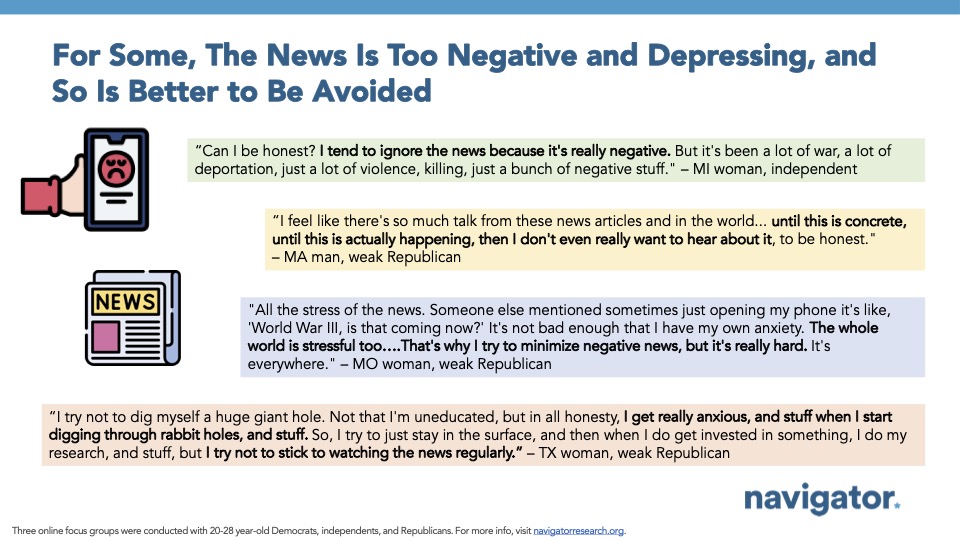
“There’s a lot of advancement going on”
AI is already intertwined into the day to day life of Gen Z. Some welcome the new technology, and others are concerned by the effect it may have.
“…I just like that there’s a lot of advancement going on, and now you don’t have to rely as much on people. And AI is very precise for certain things. So, you’re able to get high quality information quickly.” — FL woman, weak Republican
“…I think it helps me out a lot. Like, with questions that I have that are too detailed for Google, and when I just need to make … If I have to double-check something, it’s always really handy to just … I’m like, ‘Let me make sure I couldn’t say this any better.’” — OH woman, weak Democrat
“The rate at which AI specifically and machine learning and deep learning is accelerating its growth… will either kill us all… or make everything amazing.” — TX man, independent lean Democrat
“But I think this new wave of AIs, it’s going to start coming for people working office jobs and driving the Ubers and who knows what else. And it just makes me scared for when a large amount of the workforce doesn’t have a job.” — NV man, independent lean Republican
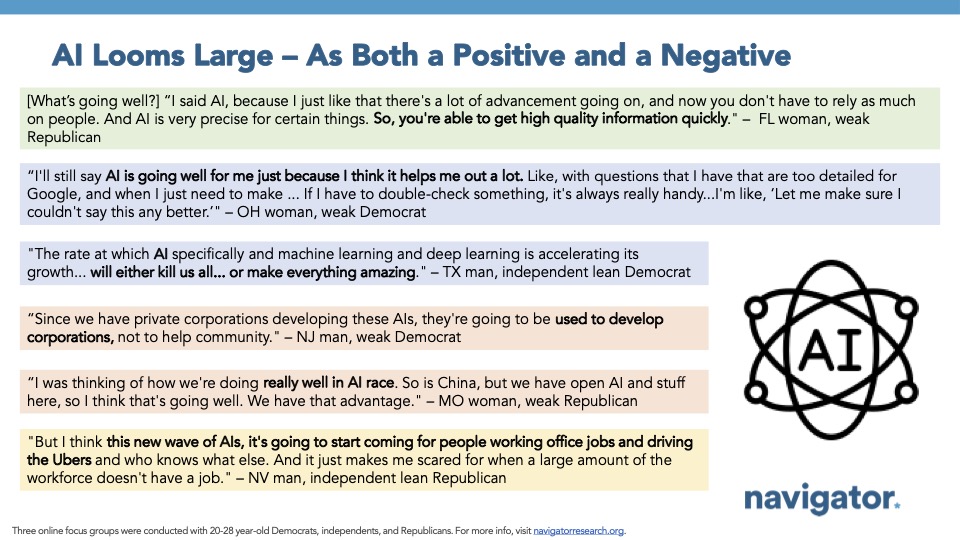
“I like at least someone who’s a little bit more passionate”
Notably, no names stood out as a unanimous voice that Gen Z is looking to for change. Outspoken figures like Zohran Mamdani, Bernie Sanders, Gavin Newsom, and President Trump were mentioned, but focus group participants named a wide variety of candidates of all different ages, demographics, and ideologies.
“Honestly, I was excited for Trump to get into [the] presidency.” — MA man, weak Republican
“I like at least someone who’s a little bit more passionate who doesn’t fall in line with a lot of establishment talking points or backslides on promises. But yeah, Mamdani or Bernie, that was the first political rally I went to was when he was in Flint in 2014/2015, and that was an awesome experience.” — MI man, weak Democrat
“For me, it would be Gavin Newsom. I know he has his issues, but I feel like the way he stood up to Trump when Trump came to LA for the fires really resonated with me. Of course, he has his own issue of being the governor of California, but I feel like he’ll be one of the only people to actually stand a chance against Trump.” — CA man, weak Democrat
